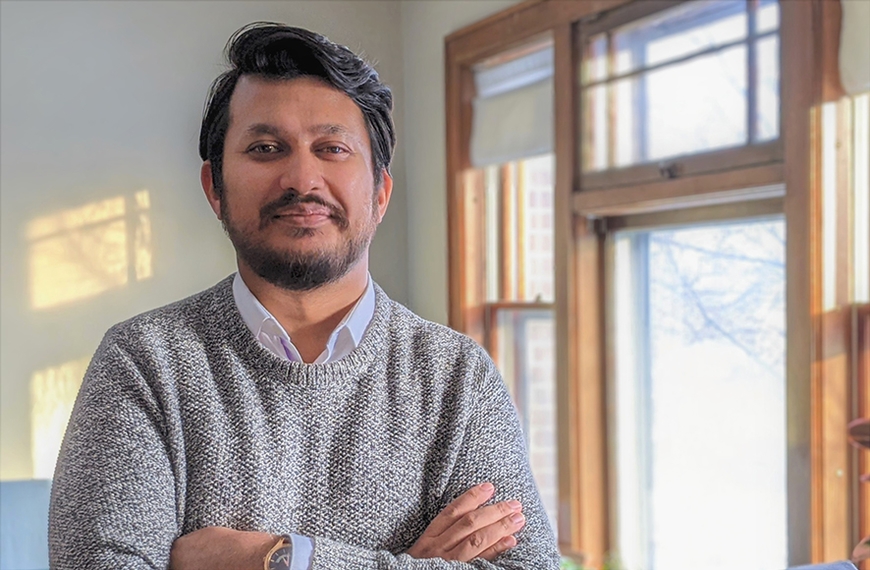PhD Candidate Wins Teaching Award
Congratulations to Moinak Choudhury, a doctoral candidate in English literature who received one of two Department of English Graduate Student Teaching Awards for 2021-2022! We asked Choudhury, who is working on the dissertation "Anxieties of Individualism: Autodidacts in the Long Eighteenth Century," to share some thoughts on teaching and pedagogy.
What do you enjoy most about teaching, and how has being a teacher enhanced your scholarship?
I like thinking about teaching in terms of communication puzzles. By that, I mean exploring how I can convey ideas in accessible and relatable ways. This takes diverse student needs into account. And for me, it's great to see when and how these pedagogical methods work (they sometimes don't!), and how I can adapt the course to build student engagement and learning. This interest is something that I perhaps carry over from my previous roles in advertising and content creation. But teaching gives me the chance to include these interests in a much more social and communal way.
Regarding my scholarship, the dissertation often seems like a daunting and distant project. The rewards of teaching are much more immediate. So, on the one hand, pedagogy helps me feel more engaged in my work. In other ways, teaching (both writing studies and literature) has helped me write and think more clearly.
How would you describe your teaching approach and practice? In what ways has your teaching practice had to change to meet the challenges of the past two years?
My teaching approach aligns with what I like about the practice. The idea of thinking about communication puzzles and building bridges—ways of making the course interesting and engaging for students—plays a key role here. Emphasis on collective pedagogy and adult learning are two other approaches which helped me during recent challenges. For example, while teaching online, I tried to design group discussion activities to help students find a sense of community and "meet" their peers during isolation. I also use teaching tools like Kahoot! to make class quizzes more interactive.
During in-person classes, students really enjoyed their visits to the Wangensteen Historical Library facilitated by Lois Hendrickson and Emily Beck; they got the chance to turn the pages of 17th-century scientific texts and learn about how they were produced. And the department's Visiting Actor program and all the actors at Mixed Blood Theatre deserve a special shout-out—they turned the boring Zoom window into a professional theater! Of course, students play a major role in solving these challenges. Last year, I went home to India to renew my visa and then everything shut down. A three-week trip turned into four months. So I ended up teaching either at 9 pm or at 3 am! But the students were sympathetic about my situation. They brought enthusiasm into the classroom during quieter days.
Who/what have provided models for you in terms of teaching best practices?
I've had some great models here at the U. For my current class "Textual Analysis: Methods," looking back at my graduate seminars with Professors Timothy Brennan, Keya Ganguly, Nabil Matar, Qadri Ismail, and Andrew Elfenbein has been incredibly helpful. I've also learnt varied approaches from my Early Modern Studies and Comparative Literature classes. The opportunity to observe methods of lecturing and student engagement during my role as TA for Professors Christopher Pexa and John Watkins provided a vital foundation as well.
Two other resources have been significant for me: professional development courses at UMN and my experience with community learning at OLLI and CCAPS. Attending the "Writing Across the Curriculum" workshops has been immensely useful in developing multimodal course assignments. I've been participating in the Equity Certificate Hosted Online (ECHO) program and their discussions. I'll also be attending the "Career Readiness Teaching Fellows Program" this semester. I'd strongly recommend these workshops. Similarly, teaching at OLLI with assistance from the ISSS's Culture Corps sparked my interest in communication bridges. For example, I wanted to talk about Indian democracy; but the issues seemed a bit overwhelming for lifelong learners. So I crafted the course around three familiar commodities: cashmere (the fabric), saffron (the spice), and tea (the leaves). Discussing the history of their trade and production in India made challenging topics about economics and politics much more accessible and interesting. And along the way, I learnt things I did not know! I now use these lessons in crafting my pedagogical practice.
What have you appreciated most about your studies here at the U?
I appreciate the support system here at the U. I think it starts with the department's administrators who make a lot of what I do feasible. From navigating international work contracts to collating teaching and student resources, their efforts let me concentrate on my teaching and scholarship. The academic network here at the U and my dissertation committee has been another key part of this support system—their feedback on my ideas is helping me overcome the common PhD impostor syndrome.
And finally, the opportunity to discuss my work and teaching with peers and colleagues has been a vital part of my experience here. (It keeps us all sane.) Recently, I wanted to include more poetry in my class this semester, but I wasn't quite familiar with contemporary US poets. So [doctoral candidate] Stephen Ellis directed me to the right resources (they're now part of the syllabus). During my studies, all of these interactions have helped me adapt and appreciate an environment that can often be challenging especially for international graduate students.



